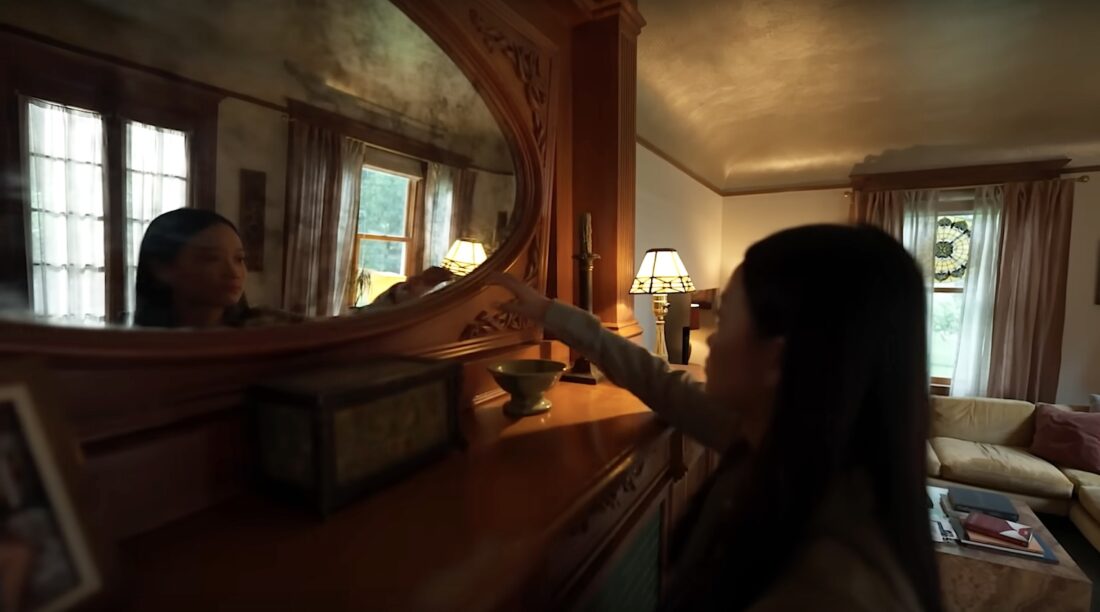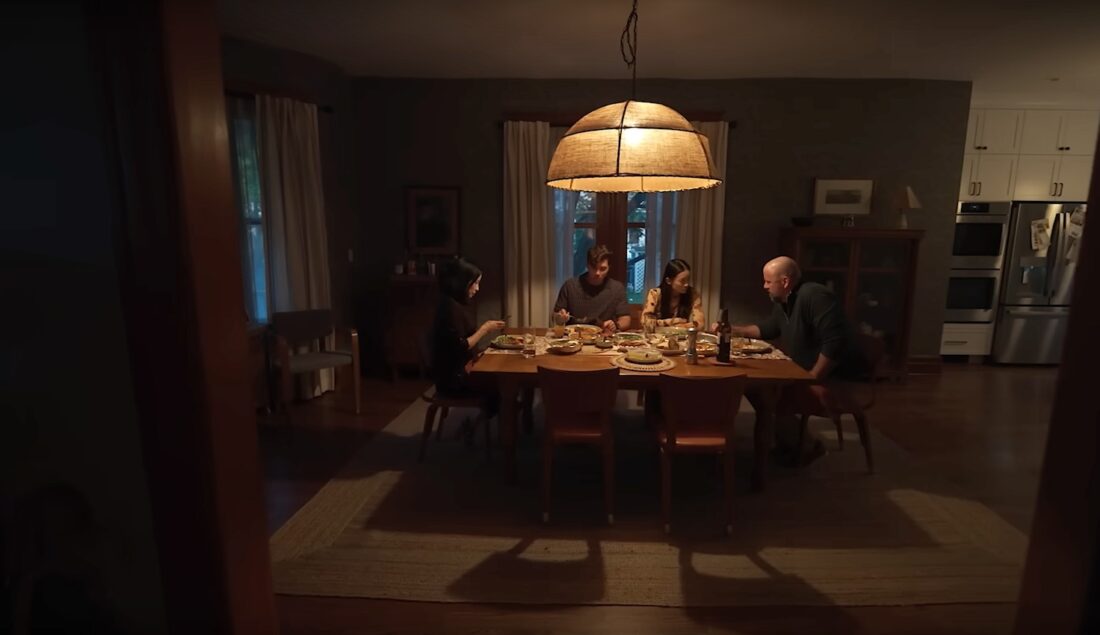Let’s start with the uncanny being in the room: Much like David Lowery’s 2017 film A Ghost Story, Presence isn’t exactly a horror movie. Horrific things happen in it, and yes, there’s a ghost, but don’t come in expecting the kind of jumpscares you’d get in a Conjuring or Insidious film, or even the spoooooky atmosphere of more classic films like The Haunting or The Changeling.
Saying literally anything will spoil the whole movie, so I’m going to give you a couple of bare facts and then tell you, in my most portentous haunted house voice, to GET OUTTTTT—until after you’ve seen it.
Presence was shot in under two weeks in 2023, and premiered at Sundance in January 2024. I mention this because I think the quick shoot adds to the sense of urgency and claustrophobia that pervades the film, and because I think the long wait between the festival premiere and wide release added to my only problem with the film. Because of that year of lead time, I’d seen lots of advance word that Presence was a terrifying twist on a horror film—when actually the film is a very good, and sad, drama with a ghost in it. It’s still speculative fiction, I think, but not exactly a horror in the way the marketing implied. It’s directed by Steven Soderbergh and written by David Koepp, who previously worked together on Kimi.
It follows the Payne family, mom Rebecca (Lucy Liu), dad Chris (Chris Sullivan), elder son Tyler (Eddy Maday), and younger daughter Chloe (Callina Liang), as they move into a new house. Tyler, a high school swimming champ, quickly befriends Ryan (West Mulholland), one of the most popular boys in their new school. Chloe is more withdrawn; her best friend Nadia died quite recently of an overdose. The family dynamic is brittle—there’s tension between Rebecca and Chris, Rebecca tends to coddle Tyler even though he’s an arrogant jerk a lot of the time, and Chloe is treated as a bit of an outcast, with Tyler being openly furious at what he sees as freakish behavior, Rebecca ignoring her daughter under the cover of giving her “time”, and Chris wanting to apply new meds and new therapists until something clicks.
We get quite familiar with all the tiny cracks in the family makeup, because they’re being watched, pretty much constantly, by a ghost. This is where Soderbergh has made a choice that will delight some people and alienate others: The movie is shot entirely from the ghost’s point of view. If the ghost can see it or hear it, so can we. If people get in a car and drive away, we have no way of knowing what’s happening. If terrible stuff starts to happen inside the house, we’re trapped in there with it, and, like the ghost, helpless.
This worked for me—if anything I think Soderbergh and his team could have pushed the conceit even further—but this isn’t the kind of movie that aims to be a spooky season classic, playing while friends hang out and carve pumpkins. This is a delicate, heartfelt drama told in a unique way, and I recommend it as that, if not as a traditional horror film. Honestly I wish it wasn’t being marketed as a horror film, because I think people are going in with expectations the movie has no interest in meeting.
Come with me for a tangent: I’ve recently fallen head-over-heels for Fontaines DC, a band that writes a lot about death, and in an interview about their newest album, the lead singer talks about how one of their songs was trying to capture a feeling of death as “a warm pat on the back” but also “terrifying”. He said that as the band worked on it, it wasn’t “about finding a balance, or about being fifty percent this and 50 percent this, it’s about being 100 percent this and also 100 percent this”.
This idea helped me realize what I like so much about Presence. I tend toward maximalism, and I love work that takes big swings, and is 100% one thing but also 100% another thing—and this movie is THAT. It’s full of sadness for the lost Presence trapped in the house, but also full of the comfort that comes from the Presence caring so much for this family. It is 100% both, and I think it works beautifully.
I’ve said a few times in reviewing horror films that one of my struggles as a film reviewer is that nothing scares me. Which isn’t completely true; there are single images from Ju-on, Insidious, Hereditary, and Twin Peaks that have stuck in my head and pop up occasionally when I try to fall asleep. And it’s happened again here, with Presence—but the image that stuck wasn’t frightening. It was unbearably sad. Like I had to sit up in bed and turn the light on for a minute so I could fall asleep again. And even then the movie wrapped itself into my dreams in an interesting, reality-blurring way.
And now, as promised: GET. OUTTTTT. because I’m going to spoil things from here.

I lied before. There are two jumpscares, one a literal jump, and one a shocking, unexpected scream—not a scream of fright, but a terrible howl of grief.
I keep coming back to A Ghost Story, that other recent film about haunting that cares more about grief than about scaring you. Lowery’s film is about legacy, about time, about whether human lives and endeavors are worth anything when our existences are so short, and maybe most of all, whether there’s anything that can cross the gulf of time and death. Lowery also uses a slow pace and long, steady, static shots to create a sense of held breath—or really to make the audience feel the ghost’s lack of breath, I think.
What Presence is more concerned with is the line between life and death—how thin that line is, how easily crossed, and how much people squander their time on this side of it. This is a movie where none of the characters listen to each other. Chris tries to reach out to Rebecca, who won’t hear him. He tries to reach out to Tyler, but the boy is so far up his own ass he can’t recognize the gift his father is trying to give him. For most of the film Chloe is adrift, alone, and the only one who seems to listen to her is Ryan—but is he? Or is he tolerating her moods in order to get more time alone with a pretty teenage girl?
The Presence makes itself known to Chloe, but she gets the sense that it wants to help them, and jumps to the conclusion that it must be her friend Nadia. The rest of the family is skeptical (or, in Tyler’s case, outright hostile)… until the being trashes Tyler’s room. Their realtor puts them in touch with her sister-in-law, whom, conveniently enough, is a medium, and the medium comes in and says all the stuff you expect a medium to say. She puts on a great show of being overwhelmed by the Presence, she says the antique silver nitrate mirror in the living room is a focal point of energy, she talks about trauma, she says the ghost has unfinished business, and possibly that it’s unstuck in time and trying to complete a task without knowing what or when it is. She seems exhausted and gulps a glass of water while her husband discreetly nudges Chris for a cash payment.
It’s everything you expect from a cinematic medium. Not too wacky, but just sketchy enough that, if you weren’t already watching the movie over the Presence’s shoulder, as it were, you’d assume she was bullshitting the family as a sidehustle. Just like you’d maybe assume that Choe’s “sensitivity” was grief and a need for attention.
We quickly understand why Chloe needs the ghost to be benevolent: She’s hoping against hope that here, finally, is someone who will pay attention to her with no strings attached. Who cares if they’re dead? It actually made me think of the other not-quite-horror film I saw in the last month, Robert Eggers’ Nosferatu. There too we have a young, vulnerable, isolated girl, desperately calling out into the dark for connection. And, as in Nosferatu, Chloe’s attempts don’t go well. There are so many different kinds of monsters waiting to devour young women.
Maybe that’s why the best scene in the movie for me had nothing to do with the ghost at all. At one point Soderbergh messes with all of our expectations: We’re watching Chloe from the Presence’s point of view as she sits and does her homework. But then, a few feet away, her door silently swings open. She doesn’t notice it, but we do. Is it a ghost? A different ghost??? Some other terrifying thing? Nope, it’s just her dad, coming up for a Dad Talk. But in one of the two actual jumpscares in the film, Chloe startles and shrieks before Chris comes all the way into the room, and it’s a fantastic moment of horror/humor in what is a pretty elegiac film. Chris, who is Going Through Some Stuff, sits at the foot of her bed and talks to her. First about his mother, who was extremely Catholic, then about his own evolving beliefs, and finally it becomes clear that this has been his on-ramp to telling her that he believes her. He believes that there is something in the house with them, no matter what Rebecca and Tyler say, and he thinks Chloe is simply more sensitive to it. More than that, he thinks she’s really special and he hopes she understands that.
It’s an extraordinary scene, I think. Here in the midst of a ghost story we see a moment of genuine care and connection between two living people.
But again, here’s what makes this film so interesting: In a regular drama, this would be a heart-wrenching scene between a father and a daughter, sure, but that would be it. In Soderbergh’s hands, in this movie, we’ve just watched a ghost watch this moment of connection—a ghost who has no form, no voice, no way to touch another person, to express love or loneliness. A ghost whose life, whatever it was, is behind them, and who has no hope at all of having this moment for itself.

Or at least, we think it doesn’t. And again, I have to beg you all to get out of here if you haven’t seen the movie and want to, because I’m about to give it all away. And be warned that I’m also going to spoil A Ghost Story to talk about the ending of Presence.
In A Ghost Story, the twist, if you want to call it that, is that one of the main characters is caught in a time loop—kind of—and he’s been haunting himself—kind of. The ghost can only watch life unfold around him, and he’s stuck in his old home for decades before he seems to commit ghost suicide (I think). He falls through time, but not space, ending up back on the site of his house, but centuries before his own birth. Since the ghost’s sense of time is completely out of joint, we have no idea how much times is actually passing for him. He watches his living self move back in and haunts himself, so we now see earlier moments from the movie from the ghost’s point of view rather than the living couple’s, and he watches himself come back as a ghost again. Then he watches the ghost haunt the people he himself haunted in the last loop.
It makes sense while you watch it.
And it becomes more of a meditation on the idea of eternal recurrence than a meditation on a ghost story. But my point is that that ghost is truly powerless. He’s been knocked out of life, his choices are to observe silently, or to act as a poltergeist and throw objects around. But he either can’t or won’t use the objects to communicate anything beyond anger, frustration, and grief.
In Presence the twist, if you want to call it that, is that the malevolent force is all too human. Because Chloe’s friend didn’t overdose or kill herself, she and another classmate were both murdered—by Ryan. He drugged them and suffocated them, and by the time they were found it seemed like they’d OD’d in their sleep. Planning the same fate for Chloe, he first roofies an already-drunk Tyler to get him out of the way, then spikes Chloe’s drink and waits for her to lose motor function.
But here’s where the movie breaks free of its self-imposed constrictions. Just as earlier Chris and Chloe had their emotional breakthrough, the kind of a conversation that forever changes the tenor of a relationship, the ghost finally reached out to Tyler directly, and (probably thanks to the boy being intoxicated), the two made tentative contact. Seeing the danger Chloe’s in, the Presence manages to break through time and corporeality to wake Tyler. He runs to Chloe’s room, tackles Ryan, and both boys crash through the window. The Presence is left looking down at the broken bodies on the ground.
This could have been it. The ghost fulfilled the purpose the medium said it had, now it can disappear or go poof, like the Ghost in A Ghost Story, right?
But no.
Soderbergh cuts to black again, but then he brings us back. We’re with Rebecca, the member of the family we know least, the one who has kept herself remote and locked down. The house is cleared out; the family is moving to escape trauma once again. But first Rebecca wants to take one last look at the last place that will hold memories of her son. The Presence makes itself known with the eerie vibration it’s used before; usually only Chloe could hear it, but this time it breaks through to Rebecca. She follows it into the loving room, and there, in the antique mirror, is Tyler.
Here is the second jumpscare.
Rebecca wails—a horrific sound in the quiet of the scene—and crumples to floor screaming. She’s not afraid, though. She knows now, really knows, that the Presence was her son all along, and that he came back, impossibly, to save his sister. Chris and Chloe rush in, and they hold Rebecca as she sobs on the floor. Here, at last, is a moment of true connection and care between the whole family. Here, finally, the Presence has made their connection, because thanks to the vision in the mirror, they are part of this moment. And finally, after 85 minutes trapped in the house, we follow the Presence as it floats through the door, takes a last look at the house, and floats up. Soderbergh gives us a slow fade to white rather than an abrupt cut to black.
Presence gives us a ghost story with a happy ending—at least as much as possible—and a ghost story where all the basic tropes are subverted to push us not towards fear, but towards empathy. It’s not a horror movie—except in the sense that, as always, the shape of horror allows artists to connect with their audience on the deepest levels. Presence has stayed in my mind just as Nosferatu did, just as A Ghost Story did, and I’m glad to be haunted.

